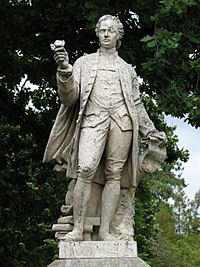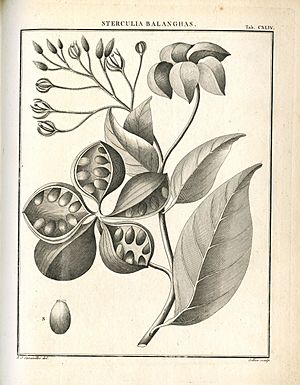Antonio José Cavanilles facts for kids
Quick facts for kids
Antonio José Cavanilles
|
|
|---|---|

Statue of Cavanilles at the Royal Botanical Garden of Madrid
|
|
| Born | 16 January 1745 Valencia, Spain
|
| Died | 5 May 1804 (aged 59) Madrid, Spain
|
| Known for | Taxonomy of Iberian, South American and Oceanian flora |
| Scientific career | |
| Fields | Botany |
| Academic advisors | Thouin, Jussieu |
| Influences | Carl Linnaeus |
| Influenced | Simón de Rojas |
| Author abbrev. (botany) | Cav. |
Antonio José Cavanilles (born January 16, 1745 – died May 5, 1804) was a very important Spanish botanist in the 1700s. A botanist is a scientist who studies plants. Cavanilles was especially good at taxonomy, which means he was skilled at naming and classifying plants.
He named many plants, especially ones from Oceania. He gave names to at least 100 different groups of plants, called genera. About 54 of these names are still used by scientists today. Some of the well-known plants he named include the Dahlia and Cobaea.
About His Life
Cavanilles was born in Valencia, a city in Spain. He lived in Paris, France, from 1777 to 1781. In Paris, he worked as a clergyman (a religious leader) and also studied plants. He learned a lot about botany from famous scientists like André Thouin and Antoine Laurent de Jussieu.
He was one of the first Spanish scientists to use the classification method created by Carl Linnaeus. This method helped scientists organize and name plants in a clear way.
After his time in Paris, Cavanilles moved to Madrid, the capital of Spain. From 1801 to 1804, he was the director of the Royal Botanical Garden of Madrid. He was also a professor of botany there, teaching others about plants.
In 1804, Cavanilles became a member of the American Philosophical Society in Philadelphia, USA. This was a special group of important thinkers and scientists.
He passed away in Madrid in 1804.
His Important Work
Antonio José Cavanilles wrote an important book called Icones et descriptiones plantarum, quae aut sponte in Hispania crescunt, aut in hortis hospitantur.... This book was published in Madrid between 1791 and 1801. It contained many drawings and descriptions of plants that grew naturally in Spain or were kept in gardens.
See also
 In Spanish: Antonio José de Cavanilles para niños
In Spanish: Antonio José de Cavanilles para niños
- List of plants of Caatinga vegetation of Brazil
- List of plants of Cerrado vegetation of Brazil
- List of Roman Catholic scientist-clerics
 | Sharif Bey |
 | Hale Woodruff |
 | Richmond Barthé |
 | Purvis Young |


